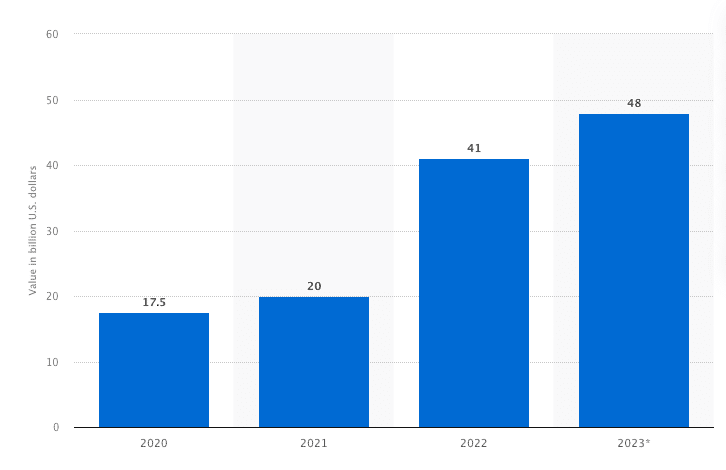Leveraging Blockchain Technology in E-commerce
29/05/23
4'
The recent surge in interest in blockchain technology is making a significant splash across search engines like Google and Bing. Today, this technology is a hot topic, with companies and individuals keen on harnessing its transformative potential. As an e-commerce enthusiast, understanding the implications of blockchain technology for your business could be game-changing.
This article will delve into the usage of blockchain technology in e-commerce, enhancing transparency, security, and overall user experience.
Blockchain Technology: Simplified
Before diving into how blockchain technology is transforming e-commerce, let’s briefly define what it is. Blockchain is a decentralized digital ledger that records transactions across multiple computers. It guarantees data integrity by preventing any modifications to the information once it’s recorded.
Unleashing Blockchain Technology in E-commerce
E-commerce has grown by leaps and bounds, with global retail e-commerce sales projected to reach $5.4 trillion in 2022. However, this growth comes with challenges, particularly in security and transparency. Enter blockchain technology – a solution that’s reshaping the future of e-commerce.
Transparency
Transparency is of paramount importance in e-commerce. Blockchain technology is aiding in providing just that. It creates an open yet secure system where all transactions are immutable and verifiable.
For instance, De Beers, the diamond giant, has implemented a blockchain platform called “Tracr” to track the provenance of diamonds. This assures customers of the ethical sourcing of the diamonds, reinforcing their trust in the brand.
Security
Security remains a significant concern in e-commerce. With a 134,29% increase in losses to online payment fraud incidents worldwide between 2020 and 2022, brands and retailers need to up their security game. Blockchain technology is contributing massively to enhancing security in e-commerce. Thanks to its decentralized and immutable nature, it’s considerably harder for cybercriminals to compromise.
Luxury brand Louis Vuitton utilizes blockchain to authenticate its products and combat counterfeiting, a move that has significantly boosted consumer confidence.

Worldwide e-commerce losses due to online payment fraud from 2020 to 2023, measured in billions of U.S. dollars (Image credit: Statista).
Go further
Improved User Experience
Blockchain technology can also heighten user experience in e-commerce. Smart contracts – self-executing contracts with the terms directly written into code – can automate processes, reducing transaction times and costs.
For example, e-commerce platform OpenBazaar uses blockchain to allow peer-to-peer transactions, eliminating transaction fees and resulting in a increase in customer purchases within the first quarter of its implementation.
The Future of Blockchain Technology in E-commerce
As blockchain technology gains traction, we can anticipate a more transparent, secure, and customer-centric e-commerce environment. Blockchain applications are forecasted to generate over $3 trillion annually by 2030, according to Gartner, indicating its massive potential in industries like e-commerce.
Conclusion
The integration of blockchain technology in e-commerce is paving the way for enhanced transparency, security, and improved user experience. It offers a solution to some of the most significant e-commerce challenges and paves the way for a more efficient and consumer-friendly industry. Embracing blockchain technology could be the key to staying ahead in the ever-evolving e-commerce landscape.
Your e-commerce library
E-commerce for Retailers
Learn moreE-commerce for Brands
Learn moreL'Oréal Luxe Success Story
Learn moreSign up for our newsletter
By submitting this form you authorize Lengow to process your data for the purpose of sending you Lengow newsletters . You have the right to access, rectify and delete this data, to oppose its processing, to limit its use, to render it portable and to define the guidelines relating to its fate in the event of death. You can exercise these rights at any time by writing to dpo@lengow.com

Trending Posts
Marketing channels
Where does Gen Z shop online?
Gen Z online shopping is transforming the digital marketplace, setting trends that redefine what it means to engage with brands…
16/04/24
9'
Marketplaces
The Top 10 Marketplaces in Europe
The e-commerce scene is a vibrant mix of marketplaces in Europe. These aren't just websites; they're bustling hubs where millions…
08/12/23
7'
Marketplaces
Lengow Now Fully Supports Zalando Logistics Solutions ZSS and ZRS
Zalando, one of Europe’s leading fashion marketplaces, continues to raise the bar with its advanced logistics and fulfillment programs. After…
12/12/24
4'
Marketplaces
How to win the Buy Box on Marketplaces (Amazon, Zalando, etc.)
What is the most important thing for marketplace sellers? Exactly, the Buy Box! If you don't have the Buy Box…
02/04/24
10'
Marketplaces
How to Sell on Temu? Best Tips
Emerging under the vast umbrella of PDD Holdings Inc., Temu has skyrocketed in popularity as a shopping sensation from China…
17/08/23
5'




